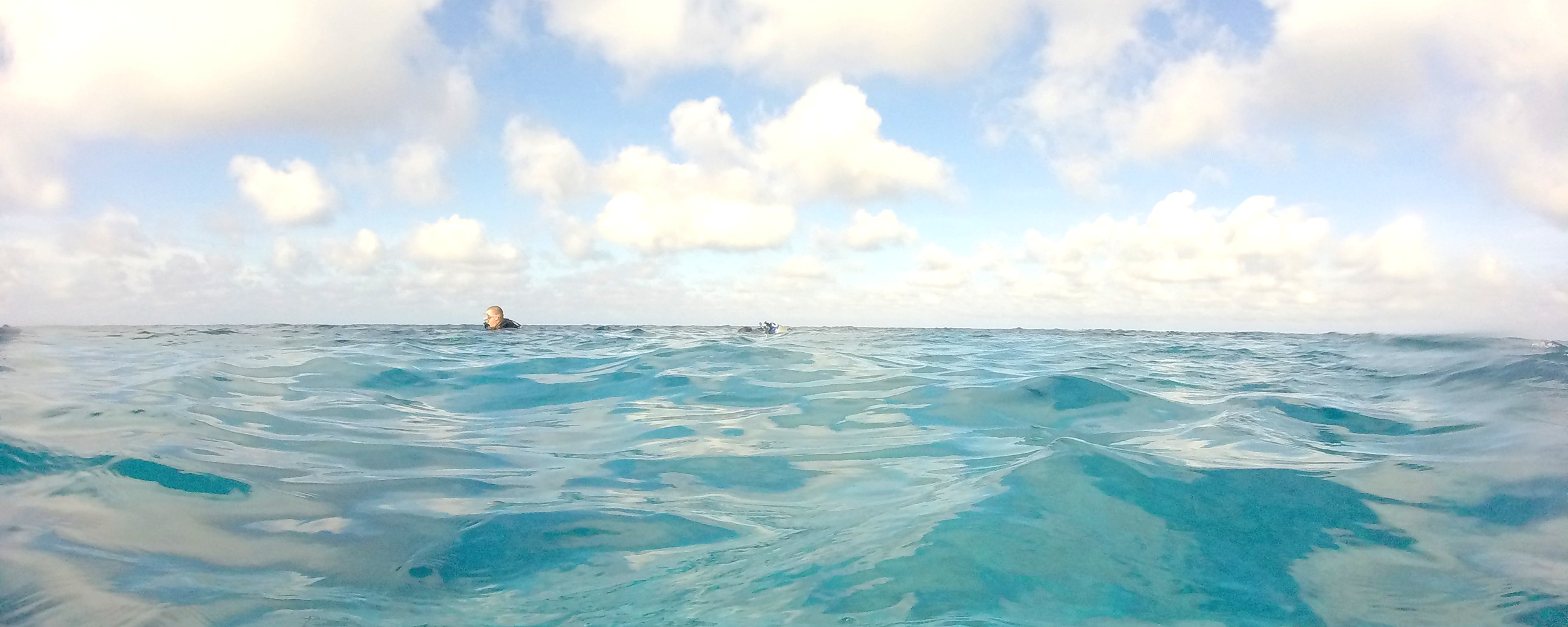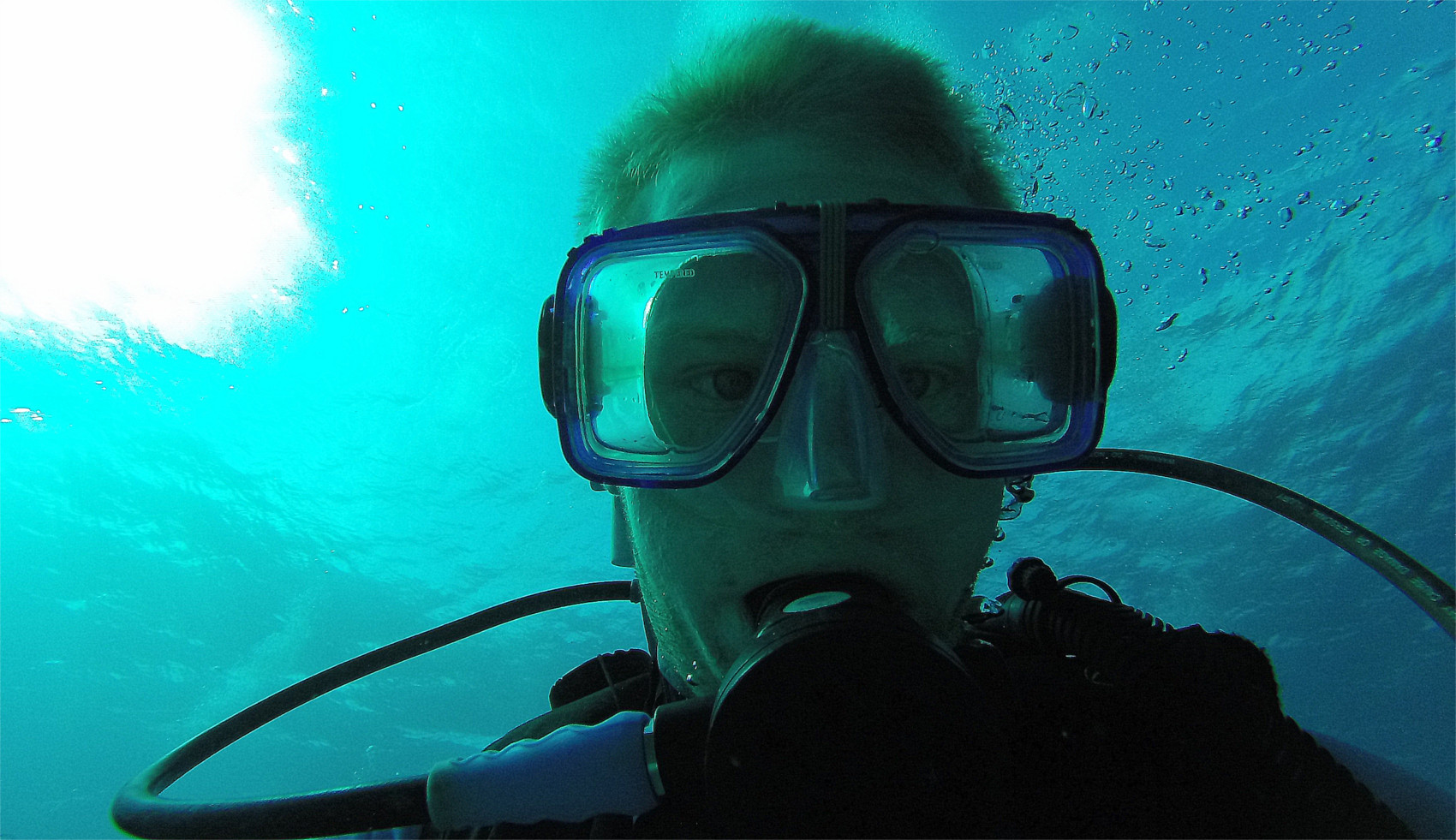
January 14, 2016
My heart raced with excitement, and the gentle bobbing in the salty ocean was doing precious little to stop it. I looked back at our boat -empty except the captain- and then at our guide. He gave the signal, and I slowly let air escape my bcd, sinking with our group below the water’s surface.
With bubbles slowly trickling away from me, our reef exploration off the coast of Cozumel had begun.
There is something tranquil about breathing underwater. Maybe it’s because it is something amazing that humans aren’t ‘suppose’ to do. Maybe it’s something peaceful about the water, the pressure, and the liquidity of the sounds. Maybe it’s because panicking is not a great option!
In any case, it is remarkably peaceful underneath the ocean waves.
And purposeful. Well, it’s just that -it turns out- there is a fair amount of caution necessary when exploring a place where you can’t naturally breath. “Keep an eye on your air.” “Keep an eye on the guide.” “Stay focused on your bouyancy.” “Absolutely, do not stop breathing.” There is a lot to think about between the fishes, and sea turtles!
Certainly, I don’t mean to dissuade anyone. In fact, I’d definitely encourage you to try it. However like most skills worth learning, and adventures worth having, it takes a healthy amount education, practice, and focus.
It’s Beginning to Come into Focus
Finding enjoyment in little adventures has been one of the most useful ways I have found to accelerate my goal obtainment, improve my satisfaction with life, and help me make meaningful improvements in myself as a person. That’s a tall order!
However, to work successfully, it can’t be about any of those results. They can’t be the focus of your adventure. Only having that unique, and challenging experience can be the focus. To drop below the water’s edge, have a look around for half an hour, and come back up unscathed. That’s it.
When the moment becomes the focus, those other benefits have a way of becoming the result.
It’s a Catch-22. It’s slight of hand. It’s the proverbially head fake. But trust me: Focus only on your adventure, and you’ll find out about the lessons you’ve really learned later.
4 Unexpected Skills I Learned from Diving
So what did I learn from this particular adventure? Let’s have at it then…
1) Composure Will Keep You Afloat
Well I mean in this case I was still underwater, but it kept me from sinking more than I wanted to.
When you are diving, a lot of the time you don’t want to be going deeper, or shallower at any given point. Especially without meaning to. This is accomplished 1) with lead weights, and 2) air let in or out of a bcd. Without getting more technical, this mostly keeps you at your desired depth.
However, your breathing also impacts your underwater buoyancy. Inhale deeply, and you will rise some. As you exhale fully, you may fall slightly. Maintaining consistent, level breathing is important to minimize these unwanted fluctuations.
But wait, there’s more! Controlled breathing also serves 3 more useful purposes underwater.
For starters, it keeps you alive, and severe injury free. I wasn’t kidding about the ‘never stop breathing’ thing. It’s critical while diving to always be slowly inhaling, or slightly exhaling to avoid injuries arising from exposure to different water pressures. Vapor-lock is a definite no-no!
It also saves your air supply. Keeping control over your breathing increases the efficiency with which you utilize the air in your tanks, giving you more time to explore Poseidon’s kingdom.
Finally, just in case you were planning on freaking out, it calms you so you don’t panic.
Yep, composure and good breathing pretty much go hand in hand. Effective underwater breathing is helped by composure, but practiced breathing techniques can also help your composure. Have you ever taken a few deep breaths to suppress your ire in the heat of a confrontation? You get the idea. However, regular practice helps to stifle those moments of less than fully rational anger before they come.
This actually doesn’t take an oxygen tank, and an ocean to practice though. Here a breathing practice you can do at home.
Deep Breathing Exercise -this is remarkably soothing.
- Sit comfortably somewhere with your back straight (I prefer with my legs crossed on the floor, arms resting gently on my knees or legs, but chairs are fine.)
- Breath in deeply while you count to 4 in your head. (At 4 you should have a full deep breath.)
- Hold your breath, and count slowly to 10.
- Slowly exhale, counting to 10 again. (At 10 you should have a full deep exhalation.)
- Pause for a a few seconds. (Whatever feels comfortable/natural.)
- Then repeat the process. (I aim for about 10 times.)
Besides being the second best method I’ve found getting to sleep, (use it if you find yourself lying in bed, unable to drift off) practicing this on a regular basis can help you become less stress reactive to situations that arise in daily life.
Good breathing is a valuable way to mediate our attitudes, moods, and, most importantly for this discussion, composure.
2) Trust in Trust
“Always dive with a buddy.” Yep, that was a big point of training too.
I trusted my friend. I’d trusted his advise before, his vision for life even. I’d trusted him with an endless stream of $20 loans, and with dreams over dinners. However, I’d never before trusted him with my life… unless you count making sure the Sunday 10 lb beef briskets are cooked safely through.
Diving demands trust, even if it is with a stranger, if only out of necessity. It’s kind of important under all that water, to have someone else with an air supply near by should something go wrong. Someone that you can communicate with using signals not voices, and who is mindful of his surroundings.
However, I learned once again that trust just makes life better. Trust is a tricky thing, and people have a lot of ideas about trust. Some say that is should be earned not given. Some think it should be given to a person until they are proven untrustworthy.
I say if you think you can trust a person with a particular matter, do it. Whether you can trust a person with something depends many factors from history, to ability, to stakes. What it should not depend on is whether you want to trust him.
Trust in trust. Choose to place a little more trust in people, and then let them know you trust them.
More often than not you’ll find that they rise to the challenge, fueled by the desire not to let you down.
Sometimes, they will though. Sometimes your trust will have been misplaced. Sometimes the waters of whether you can trust a person with a matter are too murky to see clearly, and we get it wrong. Sometimes people betray us. It sucks. Think of it as your tax for living better through trust.
Because, besides allowing us to get more done by allowing others to play their parts, trust just feels better. It is more soothing to live with trust in those around us. Be careful what you think of others. It usually impacts you, more than it impacts them. Choose to trust people. It pays dividends.
3) Be Confident in the Knowledge That You Are Better than You Think
A good adventure is always a confidence booster. It’s allows us to get in the game, and achieve something for the sake of only itself.
Learning to scuba dive is not likely to be intrinsically useful, or necessary anytime in my life. These little mind, and life hacks aside, knowing how to go down, breath underwater, and take look around is not something I am likely to ever need to know how to do. I’m not a marine biologist. I don’t plan to join the search, and rescue team. This is not a skill that is applicable to daily life.
However, that confidence gained from taking on, and learning a new, challenging skill does carryover to daily life. Knowing that you, by yourself, or as part of a team, were able to complete an ambitious undertaking with success, translates into your work, your relationships, and every aspect of your life.
After you’ve breathed underwater, and swam with barracuda is anything ever the same? How could it be!
Go into your adventures knowing that you are better than you think. New confidence will follow.
Then apply this to your work, and your life. Focus on what you are doing. While you are in the middle of a task, try doing it for the sake of itself, and not what it will get you. Participate in what you are doing, and focus on its completion. New confidence will follow.
4) Discover Awe
It is hard not to be overwhelmed by the powerful beauty of the underwater world. Colorful coral, and sponges sprawl across the sandy floor, or rise up in cliff like towers. Schools of brightly painted fish move as one, or swim motionlessly against the drift. Sharks, and barracuda glide by as a reminder of the strength of this world.
When you provide yourself with adventure, especially exploring the natural wilderness, it becomes impossible to become wrapped up in the immensity of it all. It makes mankind feel both small, and yet great. To look out at the mountains, or the ocean, or the stars witnessing the great power of nature, and to feel your place in it, is to have breakfast with God.
Seek out beautiful experiences that fill you with awe. In turn you will begin to see the beauty of the world where ever you go.
This one is hard to duplicate. By definition for an experience to fill you with this sense of awe, you are going to actually get out, and have that experience.
Actions and Practice
That’s what this is all about though, isn’t it. Provide yourself with adventures, and let the unexpected results follow you home!
All of these lessons are cyclical, and self-reinforcing. They are positive feedback loops. Breathing creates composure. Composer steadies your breath. Trust begets more trust. Confidence builds achievement. Achievement creates confidence. Witnessing powerful beauty leaves the sensation of awe, and awe trains us to search for beauty in the world. Doing a little encourages more.
Remember though, to focus on your adventure for its own sake.
There is a principle in Taoism, that to see the Tao, The Way, one cannot look directly at it. You cannot see it directly, but only in your peripheral. You must hold your attention only loosely on the goal, and focused elsewhere.
Life is about the journey, and the adventure, not just the destination.
Focus on your adventures for their own sake. Block out distractions from home, and work. Learn. Practice. Achieve the purpose of your experience.
The air you breath when you come back up will never taste the same.
-Michael Speck



Peps
January 17, 2016
Thanks Michael for your post. “When the moment becomes the focus, those other benefits have a way of becoming the result.” – I really like that. It rings true for me.
Michael Speck
January 19, 2016
Thanks Peps, I’m happy to hear it!